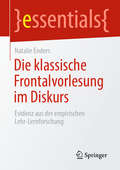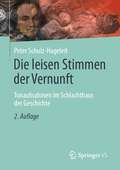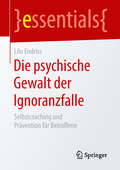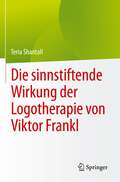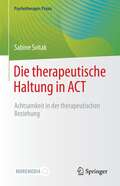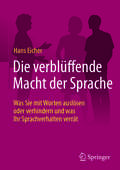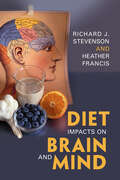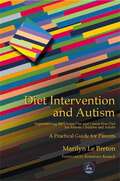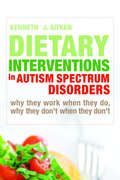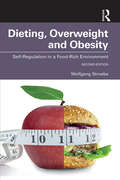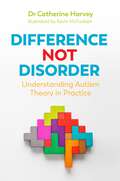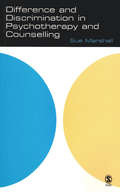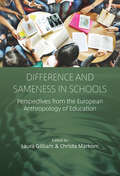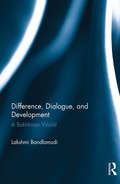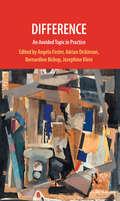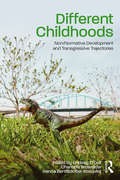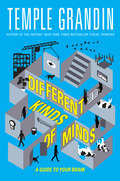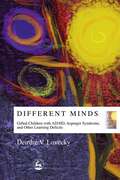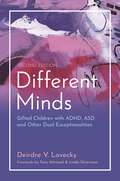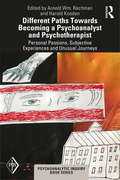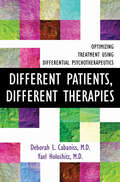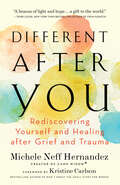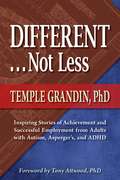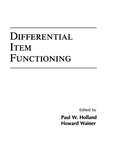- Table View
- List View
Die klassische Frontalvorlesung im Diskurs: Evidenz aus der empirischen Lehr-Lernforschung (essentials)
by Natalie EndersOb Vorlesungen nach wie vor in der Hochschullehre eingesetzt oder besser durch andere Lehrformate ersetzt werden sollten, wird kontrovers diskutiert. In diesem Buch werden in der Vorlesungsdebatte häufig angeführte Argumente für und gegen den Einsatz von Vorlesungen in der Hochschullehre kritisch analysiert. Dabei wird der wissenschaftliche Gehalt von Aussagen zur Lernwirksamkeit, zu den Lern- und Aufmerksamkeitsprozessen beim Hören von Vorträgen sowie der Lernmotivation Studierender geprüft. Abschließend werden die Erkenntnisse integriert und didaktische Empfehlungen zum Vorlesungseinsatz ausgesprochen.
Die leisen Stimmen der Vernunft: Tonaufnahmen im Schlachthaus der Geschichte
by Peter Schulz-HageleitGeschichte als Abfolge von Massentötungen aller Art und – im Gegensatz dazu – Geschichte als Konzert von leisen Stimmen, die den Frieden beschwören und Vernunft anmahnen: das sind zwei Leitmotive des Buches, die in verschiedenen Inhaltsvariationen thematisiert werden. Dabei finden die grauenhaften Tatsachen der Geschichte ebenso Berücksichtigung wie die kognitiv-emotionale Schwierigkeit, im historisch-politischen Schlachthaus-Geschehen (Kriege, Völkermorde) nicht die Augen zu verschließen, sondern vielmehr standzuhalten und existenziell für eine bessere Welt einzutreten.Was zur Zeit der ersten Auflage des Buches (2006) weit entfernt von realgeschichtlichen Möglichkeiten zu liegen schien, ein imperialistischer Eroberungskrieg, ist seit Februar 2022 bedrückende Wirklichkeit. Die veränderte weltpolitische Konstellation entwertet die früheren Reflexionen und Recherchen nicht, sondern taucht die Befunde in ein noch grelleres Licht.Das Buch wendet sich nicht nur an Personen, die Geschichte professionell erarbeiten und vermitteln, sondern an alle, die im Verhältnis zur Geschichte, wie es medienwirksam präsentiert und zelebriert wird, Probleme sehen.
Die psychische Gewalt der Ignoranzfalle: Selbstcoaching Und Prävention Für Betroffene (Essentials)
by Lilo EndrissLilo Endriss vermittelt in diesem essential, wie verborgene Mechanismen ignoranter Verhaltensweisen durchschaut werden können und wie man sich durch Selbstcoaching dagegen wehrt. Denn subtile seelische Gewalt in Form von ignoranten Verhaltensweisen kann den Menschen genau wie körperliche Gewalt tief verletzen. Menschen sind auf Resonanz angewiesen, wie dies etwa durch die Entdeckung der Spiegelneuronen erforscht wurde. Wer ausgegrenzt, ständig übersehen oder überhört wird, erlebt dies als Kränkung. Diese besondere Form des Mobbings, die sowohl im Berufs- als auch im Privatleben stattfindet, kann nur durchbrochen werden, wenn sich Betroffene aus der Täter-Opfer-Verwicklung befreien.
Die sinnstiftende Wirkung der Logotherapie von Vıktor Frankl
by Teria ShantallDieses Buch bietet eine eingehende Analyse der Logotherapie von Viktor Frankl und taucht in die spirituellen Tiefen einer inhärenten Suche nach dem Sinn des Lebens ein. Geschrieben von einem sehr erfahrenen und kompetenten Logotherapeuten, der von Frankl selbst ausgebildet wurde, ist dieses Buch aufregend neu und einzigartig, da es den Leser in der Rolle des Klienten, begleitet vom Autor in der Rolle des Therapeuten, durch den sich entfaltenden, phasenweisen Prozess der Logotherapie führt. Die Logotherapie wird als Tiefen- und als Höhenpsychologie erforscht. Ausgehend von einem provozierten Willen zum Sinn aus den Tiefen des spirituellen Unbewussten führt der Autor die Suche nach dem Sinn zu den ultimativen Höhen bei der Erreichung der menschlichen Größe. Dieses Buch lässt Frankls eigene tiefe Lebensorientierung wieder lebendig werden und hat in seinem leserfreundlichen Stil die Frische von Frankls eigener Art zu schreiben. Es ist in einem erfrischend einfachen und geradlinigen Stil geschrieben, der einer breiten Leserschaft leicht zugänglich ist. Es enthält Fallstudien und Übungen für die Leser und ist für den Einsatz in Logotherapiekursen weltweit gedacht. Darüber hinaus wird es Laien, die einen tieferen Sinn für ihr Leben suchen, Psychologiestudenten und Fachleute für psychische Gesundheit gleichermaßen ansprechen.
Die therapeutische Haltung in ACT: Achtsamkeit in der therapeutischen Beziehung (Psychotherapie: Praxis)
by Sabine SvitakDieses Therapiemanual beschreibt für Psychotherapeutinnen und Psychotherapeuten die therapeutische Allianz aus der ACT-Perspektive (ACT: Akzeptanz- und Commitment-Therapie), einem Therapieverfahren, das klassisch kognitiv-verhaltenstherapeutische Interventionen mit achtsamkeits- und akzeptanzbasierten Strategien kombiniert. An der Praxis orientiert, stellt die Autorin zunächst die theoretischen Grundlagen dar. Sie macht danach das sog. Hexaflex der ACT nutzbar: sechs Prozesse, angewandt auf die therapeutische Beziehung, welche Leserinnen und Leser kennenlernen, reflektieren und in der eigenen Praxis einsetzen können. Audio-Übungen und Fallbeispiele runden die Lektüre ab. Dieses Buch unterstützt Therapeutinnen und Therapeuten nicht nur in einer Beziehungsgestaltung, die die Therapie wirksamer werden lässt, sondern auch in einem selbstfürsorglichen Umgang als Prävention des Burnouts in der therapeutischen Arbeit. Mit Gewinn lesbar auch ohne ACT-Kenntnisse. Stichworte aus dem Inhalt: Therapeutische Haltung und Beziehung – Achtsamkeit – ACT – Defusion – Akzeptanz – Präsenz – Selbst als Konzept – Werte – Engagiertes Handeln. Über die Autorin: Dr. phil. Dipl.-Psych. Sabine Svitak, Psychologische Psychotherapeutin, Verhaltenstherapeutin, Supervisorin und Ausbilderin, seit 2011 niedergelassen in eigener Praxis, interessiert sich insbesondere für die Integration von achtsamkeitsbasierten Verfahren in der kognitiven Verhaltenstherapie. Leitung von ACT-Fortbildungen und engagiert in der ACT-Community.
Die verblüffende Macht der Sprache: Was Sie mit Worten auslösen oder verhindern und was Ihr Sprachverhalten verrät
by Hans EicherDieses Buch beschreibt die Mechanismen der Sprachverarbeitung im Gehirn – dem Dreh- und Angelpunkt für die Wortwirkung. Dort wird entschieden, was Worte beim Empfänger auslösen und welche Reaktionsketten sein Verhalten triggern. Worte wirken im Gehirn wie ein Medikament – nur schneller und zuverlässiger. Das Wissen um diese Mechanismen macht jede Kommunikation wirksamer und einfacher. Zahlreiche reale Beispiele führen zu sofortigen Aha-Erlebnissen. Sie illustrieren eindrucksvoll, wie machtvoll Worte sind, was sie bei Mitarbeitern oder Verhandlungspartnern auslösen können und zeigen, wie sie mit besserer Wirkung eingesetzt werden – im Berufsleben wie in vielen anderen Lebenssituationen.Nicht zuletzt verraten Worte immer etwas über den Menschen, der sie ausspricht. Oftmals mehr, als diesem lieb sein kann. Dieses Buch vermittelt Ihnen, wie Sie aus dem Sprachverhalten eines Menschen die „DNA“ seiner Persönlichkeit erkennen und sein Verhalten entschlüsseln. Die 2. Auflage wurde sorgfältig durchgesehen und korrigiert.
Diet Impacts on Brain and Mind
by Richard J. Stevenson Heather FrancisEverybody eats, and what we eat – or do not – affects the brain and mind. There is significant general, applied, academic, and industry interest about nutrition and the brain, yet there is much misinformation and no single reliable guide. Diet Impacts on Brain and Mind provides a comprehensive account of this emerging multi-disciplinary science, exploring the acute and chronic impacts of human diet on the brain and mind. It has a primarily human focus and is broad in scope, covering wide-ranging topics like brain development, whole diets, specific nutrients, research methodology, and food as a drug. It is written in an accessible format and is of interest to undergraduate and graduate students studying nutritional neuroscience and related disciplines, healthcare professionals with an applied interest, industry researchers seeking topic overviews, and interested general readers.
Diet Intervention and Autism: Implementing the Gluten Free and Casein Free Diet for Autistic Children and Adults - A Practical Guide for Parents
by Marilyn Le Breton Rosemary KessickPeople with autism often are intolerant of gluten (a protein in four types of cereal) and casein (a protein found in animal milk). There are many testaments to the benefits for such people of a diet that excludes gluten, casein, monosodium glutamate and aspartame, and these persuaded Marilyn Le Breton to put her autistic son Jack on the diet. This is the book that Marilyn wishes had been available to her when she first did so. In it she explains what the diet is all about and how it works, what foods can form part of the diet and what should be excluded. She addresses frequently asked questions and misconceptions, such as 'Is the diet too difficult and time-consuming? How strictly do I need to adhere to it? Is the diet expensive to implement?' and gives practical advice on basic equipment and ingredients, what to expect when your child starts the diet, how to adapt family meals and how to minimise cross-contamination in the kitchen. The book includes a wide selection of recipes, an extensive list of addresses and websites of suppliers of foodstuffs in the UK, and suggestions for finding out more information. It is the first book of its kind to be written specifically for those living in the UK. Marilyn's own experience and sensible approach ensure that this book will be invaluable for any parent of a child with autism, or any adult considering embarking on the diet.
Dietary Interventions in Autism Spectrum Disorders: Why They Work When They Do, Why They Don't When They Don't
by Kenneth Aitken'Given the increased interest in the relationship between diet and autism spectrum conditions, this is a timely publication which is both thorough and balanced in content. Parents and professionals alike will find this book of use by virtue of Ken's meticulous reviews of current scientific evidence for a variety of diets combined with practical advice on the application of such interventions.' - Dr. Paul Whiteley, Autism Research Unit 'Dr. Aitken provides a timely synthesis of diet interventions in autistic spectrum disorders set within a framework of historical and political references. This informative work offers invaluable assistance to the wider clinical team, further enabling effective support and guidance to the ASD community in its quest for a healthy future.' - Rosemary Kessick, former CEO of AiA (Allergy Induced Autism) Research in autism increasingly indicates the existence of different forms of the condition, and the possibility of dietary interventions having a positive effect on symptoms and behaviours associated with autism. The author explores the main dietary approaches that have been advocated in ASD. For each approach, the author explores the potential benefits; evidence for and against the diet and its relation to different genetic conditions; and information, where available, on relevant publications, web resources and support groups. The author proposes an approach, the Simple Restriction Diet (SRD), which he describes in detail, explaining how to implement this approach and how to use it to work out whether a dietary approach is of benefit. This book will be a valuable resource for families, individuals and professionals wishing to understand and explore the possibilities of dietary interventions and the benefits they can have for those on the autism spectrum.
Dieting, Overweight and Obesity: Self-Regulation in a Food-Rich Environment
by Wolfgang StroebeWhy do so many people become overweight and obese and why do they find it so difficult to lose weight? In this second edition of his influential book on Dieting, Overweight and Obesity, Wolfgang Stroebe – who developed the goal conflict model of eating – explores the physiological, environmental and psychological influence on weight gain and examines how these processes are affected by genetic factors. Like the first edition, the book takes a social-cognitive approach to weight regulation and discusses how exposure to environmental cues can set-off overeating in chronic dieters. In addition to extensively revising and updating the chapters of the first edition, this second edition features three new chapters. The chapter on successful restrained eating reviews personality factors as well as recent experimental research on impulse control. The chapters on psychological treatment of obesity and on primary prevention describe and evaluate the various treatment and prevention approaches and the research conducted to assess their efficacy. This book is essential reading for students, researchers and clinicians interested in an up-to-date review of the field of eating research and a new theoretical approach to the study of overweight and obesity.
Difference Not Disorder: Understanding Autism Theory in Practice
by Dr Catherine Harvey Kevin McFaddenInterventions and educational approaches for children with autism spectrum disorders have developed in response to the different models for how autism has been constructed and understood. This book explores the evolving theories on autism and how these have impacted the interventions and outcomes in education. Drawing on 30 years of professional experience and detailed research, Harvey exposes the myths around autism, advocates for understanding autism as difference rather than impairment, and provides practical guidance on teaching and learning, behaviour management, addressing sensory and physical needs of children with ASD. This accessible overview shows how to put autism research into practice, learn from historic mistakes and create the most supportive environment for children on the autism spectrum.
Difference and Discrimination in Psychotherapy and Counselling (The School of Psychotherapy & Counselling)
by Dr Sue Marshall'Prejudice is, for good or ill, a part of our nature. It is instilled in us from birth onwards. All we can hope to do is to combat it, and the first tool in our armoury must be that of awareness. Without this, it is very difficult, perhaps impossible, for the psychotherapist or counsellor to explore how it might be influencing the psychotherapy relationship. Sue Marshall has, in this book, performed a valuable task in that direction, and has done in it very cogently in a most difficult area. I applaud her' - Joe Sinclair, Nurturing Potential Difference, prejudice and discrimination are issues which all counsellors and psychotherapists need to address as part of their personal and professional development. Designed to support training on these complex issues, Difference & Discrimination in Counselling & Psychotherapy helps therapists understand the experience of discrimination, as well as explore their own - often unconscious - attitudes to others, based on gender, sexuality, race, culture or mental health. For most therapists an attitude of acceptance and non-judgmentalism is fundamental to their view of practice. However, in seeking to be non-judgmental, therapists may run the risk of concealing their own prejudices. It is only by facing up to these attitudes and exploring them that therapists are able to fully relate to their clients and help them effectively. Synthesising sociological knowledge with her experience of a practitioner, Sue Marshall powerfully demonstrates both the importance and the practicalities of developing awareness about difference. Difference & Discrimination in Counselling & Psychotherapy offers a straightforward approach to some of the most difficult issues relating to practice, making it an ideal text for use in training and for qualified therapists continuing their professional development.
Difference and Sameness in Schools: Perspectives from the European Anthropology of Education (EASA Series #48)
by Laura Gilliam and Christa MarkomPresenting European Anthropology of Education through eleven studies of European schools, this volume explores the constructing and handling of difference and sameness in the central institutions of schools. Based on ethnographic studies of schools in Greece, England, Norway, Italy, Switzerland, the Czech Republic, Spain, Austria, Russia, Germany, the Netherlands and Denmark, it illustrates how anthropological studies of schools provide a window to larger society. It thus offers insights into cultural lessons taught to children through policies, institutional structures and everyday interactions, as well as into schools’ entanglement in state projects, cultural processes, societal histories and conflicts, and hence into contemporary Europe.
Difference, Dialogue, and Development: A Bakhtinian World
by Lakshmi BandlamudiDifference, Dialogue, and Development is an in-depth exploration of the collected works of Mikhail Bakhtin to find relevance of key concepts of dialogism for understanding various aspects of human development. Taking the reality of differences in the world as a given, Bandlamudi argues that such a reality necessitates dialogue, and actively responding to that necessity leads to development. The varied works of Bakhtin that span several decades passing through the most tumultuous period in Russian history, are brought under one banner of three D’s – Difference, Dialogue and Development – and the composite features of the three D’s emerge as leitmotifs in every chapter.
Difference: An Avoided Topic in Practice (The\lcp Practice In Psychotherapy Ser.)
by Bernardine BishopDifference is a complex and often disturbing issue. The purpose of this book is to encourage a culture of open enquiry into an emotionally charged subject which, the editors argue, has been largely avoided by the profession. Theoretically psychoanalysis is all about recognition and appreciation of difference, yet the psychoanalytic profession itself does not have a good reputation in this area. This is a courageous collection of papers. All contributors have been prepared to go into print about situations in which difference is a significant element in their work and one around which they have felt uneasy and uncertain as they have found themselves in uncharted territory. Through painstaking analysis of their experience and that of their patients and clients, each contributor provides the reader with some useful insights and guidelines for future reference as well as some clear and stimulating illustrations of effective thinking in strange and disturbing situations. What makes this thinking effective is the demonstrated ability of all contributors to preserve their analytic functioning whatever the circumstances.
Different Childhoods: Non/Normative Development and Transgressive Trajectories
by Lindsay O'Dell Charlotte Brownlow Hanna Bertilsdotter-RosqvistDifferent Childhoods: Non/Normative Development and Transgressive Trajectories opens up new avenues for exploring children’s development as contextual, provisional and locally produced, rather than a unitary, universal and consistent process. This edited collection frames a critical exploration of the trajectory against which children are seen to be ‘different’ within three key themes: deconstructing ‘developmental tasks’, locating development and the limits of childhood. Examining the particular kinds of ‘transgressive’ development, contributors discuss instances of ‘difference’ including migration, work, assumptions of vulnerability, trans childhoods, friendships and involvement in crime. Including both empirical and theoretical discussions, the book builds on existing debates as part of the interrogation of ‘different childhoods’. This book provides essential reading for students wishing to explore notions of development while also being of interest to both academics and practitioners working across a broad area of disciplines such as developmental psychology, sociology, childhood studies and critical criminology.
Different Faces of Attachment
by Hiltrud Otto Heidi KellerAttachment between an infant and his or her parents is a major topic within developmental psychology. An increasing number of psychologists, evolutionary biologists and anthropologists are articulating their doubts that attachment theory in its present form is applicable worldwide, without, however, denying that the development of attachment is a universal need. This book brings together leading scholars from psychology, anthropology and related fields to reformulate attachment theory in order to fit the cultural realities of our world. Contributions are based on empirical research and observation in a variety of cultural contexts. They are complemented by careful evaluation and deconstruction of many of the underlying premises and assumptions of attachment theory and of conventional research on the role of infant-parent attachment in human development. The book creates a contextual cultural understanding of attachment that will provide the basis for a groundbreaking reconceptualization of attachment theory.
Different Kinds of Minds: A Guide to Your Brain
by Temple GrandinAlbert Einstein. Steve Jobs. Elon Musk. Katharine Johnson. These geniuses are all visual thinkers. Are you?Do you like puzzles, coding, and taking things apart? Do you write stories, act in plays, slay at Wordle? The things you are good at are clues to how your brain works. Are you good at math? Working with your hands? Are you a neat freak or a big mess?With her knack for making science easy to understand, Temple Grandin explains different types of thinkers: verbal thinkers who are good with language, and visual thinkers who think in pictures and patterns. You will discover all kinds of minds and how we need to work together to create solutions to help solve real-world problems.
Different Minds: Gifted Children with AD/HD, Asperger Syndrome, and Other Learning Deficits
by Deirdre V LoveckyThrough recognizing the different levels and kinds of giftedness, this book provides an insight into the challenges and benefits specific to gifted children with attention difficulties. Explaining why certain children are gifted and how giftedness is manifested, each chapter on a specific topic addresses the relevance for children with AD/HD and Asperger Syndrome. Lovecky guides parents and professionals through methods of diagnosis and advises on how best to nurture individual needs, positive behavior and relationships at home and at school. Lovecky explores concepts such as asynchrony and the effects of such `uneven' development on children, using case studies to illustrate emotional, intellectual, creative and social development. She also highlights the inadequate measures currently in place to assist parents and teachers and goes on to clearly define what is required to understand and help these children so that their needs can be met more positively in the future. Different Minds, with its wealth of practical and background information, is essential reading for all those who live or work with gifted children with attention difficulties.
Different Minds: Gifted Children with ADHD, ASD, and Other Dual Exceptionalities, Second edition
by Deirdre V LoveckyIn this fully updated second edition, this book provides an insight into the challenges and benefits specific to gifted children with attention difficulties. Recognising the different kinds and levels of giftedness, it explains why certain children are gifted and how giftedness is manifested, with each chapter addressing the relevance of a specific topic for children with AD/HD and Asperger Syndrome. Lovecky guides parents and professionals through methods of diagnosis and advises on how best to nurture individual needs, positive behaviour and relationships at home and at school.Lovecky explores concepts such as asynchrony and the effects of such `uneven' development on children, using case studies to illustrate emotional, intellectual, creative and social development. She also highlights the inadequate measures currently in place to assist parents and teachers and goes on to clearly define what is required to understand and help these children so that their needs can be met more positively in the future. Different Minds, with its wealth of practical and background information, is essential reading for all those who live or work with gifted children with attention difficulties.
Different Paths Towards Becoming a Psychoanalyst and Psychotherapist: Personal Passions, Subjective Experiences and Unusual Journeys (Psychoanalytic Inquiry Book Series)
by Arnold Wm. RachmanThis book describes the personal journey of a collection of contributors, detailing their pathways to becoming psychoanalysts and psychotherapists, with insights from many of the most interesting analysts in the field. The history of psychoanalysis and psychotherapy indicates that the pioneers were individuals who came from different pathways, such as medicine, law, education, and art. The integration of men and women with different educational and career backgrounds enhance the intellectual and clinical evolution of the field. Here, Arnold Rachman and Harold Kooden have invited a diverse group of practicing clinicians to demonstrate that psychoanalysis and psychotherapy continues to welcome and integrate individuals with a wide variety of intellectual interests and atypical career pathways. In showing how varied and personalized the route into analysis can be, this book will be of great interest to clinicians of all levels and experience, and will offer inspiration to those just entering the profession.
Different Patients, Different Therapies: Optimizing Treatment Using Differential Psychotherapuetics
by Deborah L. Cabaniss Yael HoloshitzOptimizing treatment choice through understanding more than twenty popular types of therapy. Different Patients, Different Therapies is a guide to choosing among the many psychotherapeutic options available to patients and therapists today. Offering a systematic approach, Deborah L. Cabaniss and Yael Holoshitz outline more than twenty different types of therapy, including psychodynamic psychotherapy, CBT, DBT, MI, and ACT. At the heart of the book are vignettes of typical clinical situations, accompanied by commentary about treatment choice from more than thirty psychotherapy experts. Written in accessible, jargon- free language, this book is as suitable for an introductory class on psychotherapy for any mental- health training program as it is for a seasoned therapist or someone considering psychotherapeutic treatment. Chapters include exercises to help readers think through new ways of helping patients to optimize treatment decisions.
Different after You: Rediscovering Yourself and Healing after Grief and Trauma
by Michele Neff HernandezA Life-Affirming Process That Provides Transformative Support No one who lives and loves will be immune from grief and trauma. While this suffering is universal, living through a devastating event often leaves people feeling alone and even alienated. Michele Neff Hernandez experienced this when her thirty-nine-year-old husband died after being hit by a car while riding his bicycle. Her most transformative realization was that grief changes us. There is no going back or bucking up. Life is now different. In Different after You, Michele presents easy-to-digest steps based on her work with thousands of widowed people and her innovative grief support programs. Through this process, anyone who has experienced life-altering trauma will discover a map for grieving what they’ve lost, identifying what they’ve gained, and learning to embrace the person they’ve become.
Different, Not Less: Inspiring Stories of Achievement and Successful Employment From Adults With Autism, Asperger's, and ADHD
by Temple Grandin Tony Attwood<p>Temple Grandin offers the world yet another great work, an inspiring and informative book that offers both hope and encouragement. <p>In these pages, Temple presents the personal success stories of fourteen unique individuals that illustrate the extraordinary potential of those on the autism spectrum. <p>One of Temple’s primary missions is to help people with autism, Asperger’s Syndrome, and ADHD tap into their hidden abilities. Temple chose these contributors from a wide variety of different skill sets to show how it can be done. Each individual tells their own story in their own words about their lives, relationships, and eventual careers. The contributors also share how they dealt with issues they confronted while growing up, such as bullying, making eye contact, and honing social skills. <p><i>Different...Not Less</i> shows how, with work, each of the contributors: <p> <li>Found invaluable mentors <li>Learned skills necessary for employment when young <li>Became successfully employed <li>Developed self-confidence <li>Faced the challenges of forming and maintaining relationships (and sometimes) Raised families</li> </p>
Differential Item Functioning
by Howard Wainer Paul W. HollandTest fairness is a moral imperative for both the makers and the users of tests. This book focuses on methods for detecting test items that function differently for different groups of examinees and on using this information to improve tests. Of interest to all testing and measurement specialists, it examines modern techniques used routinely to insure test fairness. Three of these relevant to the book's contents are: * detailed reviews of test items by subject matter experts and members of the major subgroups in society (gender, ethnic, and linguistic) that will be represented in the examinee population * comparisons of the predictive validity of the test done separately for each one of the major subgroups of examinees * extensive statistical analyses of the relative performance of major subgroups of examinees on individual test items.
